Badger baiting: The story behind the convictions
 BBC
BBCFour badger baiters have been convicted after being caught on camera by a BBC undercover investigation.
BBC Wales Investigates producer Clare Hutchinson explains how they went about making the programme that exposed the highly secretive blood sport.
"The challenges of making a programme like this are huge... there is so much uncertainty because you don't know if all your effort will come to anything, until that moment when the undercover work comes together," she said.
Clare and her team wanted to investigate illegal blood sports and after speaking to animal welfare organisations they learnt badger baiting was one of the more prolific blood sports in Wales.
"At the time I had heard of it but I had no idea what it actually involved," she said.
"What I learned completely shocked me. It's as cruel to the dogs that are encouraged to fight as it is to the badgers themselves."
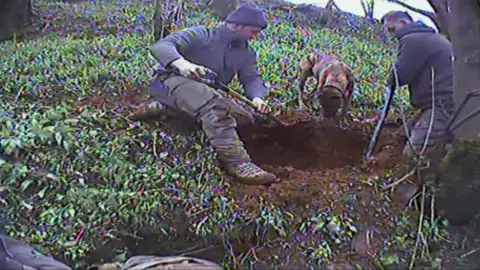
"It's a highly covert activity, insular groups, very difficult to get the information of what they're doing," the RSPCA's chief inspector Ian Briggs told the programme.
"Wales has a particular problem because of the remoteness and the ease in which they can carry out their activities.
"They live and breathe taking their dogs out into the countryside to kill wildlife."
The production team received a tip-off that many badger baiters gather on closed or secret social media groups dedicated to working dogs.
"Most people who own working hunting dogs are hunting legally but we were told for the small minority who hunt with dogs illegally these groups are where they gather to swap photos and stories, and arrange to breed their dogs to create ultimate badger 'killing machines'," said Clare.
"At the BBC you have to satisfy a very high public interest test before you can go undercover in any way - even online."
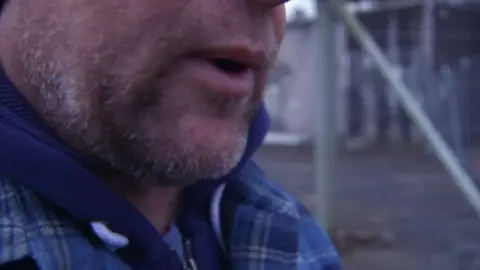
After joining groups dedicated to working dogs the team quickly identified a number of people whose posts looked "suspect".
"Nobody would openly discuss killing badgers, but they had code words: a badger was a 'pig', a fox was a 'ginger' or 'teeth'," she said.
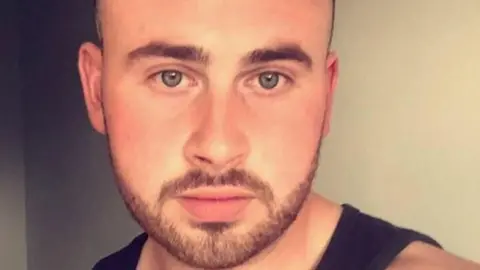
"Badgers have extremely sharp teeth and strong jaws that lock onto their attacker, so hunters would post photos of dogs covered in blood or sometimes tributes to dogs that had died underground.
"Some people would react in the comments by praising or condemning their actions."
The team had to gather lot of evidence on the actions of individual hunters before they could make an approach.
Six months after joining the groups, undercover reporter "Aaron" spoke to a member of a group on the phone and she then put him in touch with Thomas Young from Newbridge, Caerphilly.
Young had a bull-cross dog and two smaller terriers. He believed "Aaron" was keen to try badger baiting and owned a large lurcher.
In the programme, during a phone call with 'Aaron', Young invites him to bring his lurcher on a hunt.
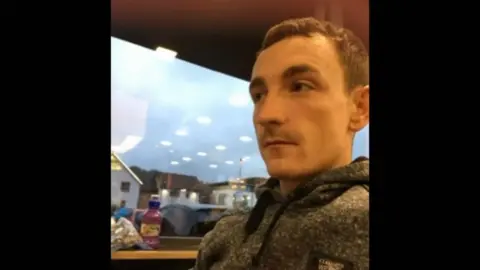
He is heard saying: "You want to try your dog, you could try your dog, like.
"Let my dog mangle it… he'll go and then grab it by its throat and its going nowhere like, you know what I mean.
"Then you could slip your dog into it. Then basically the two dogs will kill it."
On 24 March 2018, "Aaron" along with a second undercover journalist he introduces as his friend "John", joined Young and three other men - Christian Latcham, Cyle Jones and Jamie Rush, on a trip to a remote area in Llanddewi Velfrey near Narberth in Pembrokeshire.
Latcham has a previous conviction for badger baiting in 2011 and has been banned indefinitely from keeping dogs.
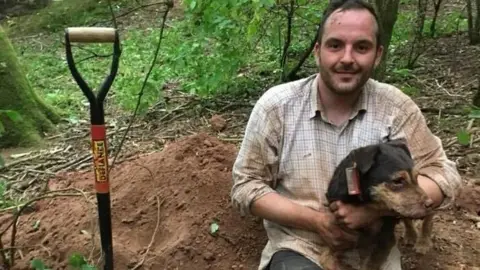
On the journey there Young tells "John": "There's always a farmer, where we're going it's permission, it's not dodgy like… they want you to go and sort their pest problem out like."
But Ian Briggs from the RSPCA disagrees: "A lot of the time they say they are doing a service to the rural community, especially with badgers and things like TB… it's just purely a smokescreen.
"What these people like doing is killing stuff. The vast majority of famers are wholly against this activity."
After arriving at the site picked for the badger baiting, "John" fears Jones and Rush had become suspicious of him: "They did ask some questions and then went quiet but quickly they got over that then back into the excitement and off they went with quite a bit of speed across the field to the sett that they were targeting," he says in the programme.
Footage used in the Secret World of Badger Baiters shows the men putting a transmitter collar on a terrier before sending it down a hole in the ground.
The men follow the dog's progress from above ground using a locator box which picks up the signal from its collar.
After several attempts muffled barks can be heard suggesting a terrier has found its prey.
The men can be seen frantically digging into the badger's sett, initially spot the badger but it disappears deeper underground.
They believe the badger has thrown an earth wall up underground between it and the terrier so the attempt is abandoned and the dog is taken out and checked over for injuries.
Eventually after digging for 10 hours they call it a day.
No badger was caught that day but the footage prompted the RSPCA to launch an inquiry after the footage was broadcast in May 2018.
The four were arrested and put on trial accused of attempting to kill, injure or take a badger during this incident.
On Thursday a district judge found all four men guilty at Cardiff Crown Court.
But this is the second time Young and Jones have found themselves in court as a result of filming used in the Wales Investigates programme.
In June, the programme's footage - including a Forest of Dean hunt where a badger was killed - formed part of a case against Young and Jones.
Young was sentenced to 20 weeks after admitting to six badger and animal cruelty offences.
Jones was sentenced to 18 weeks after admitting two charges of unnecessary cruelty to animals, relating to two dogs that were injured.
Jones was given a custodial sentence because he was not allowed to keep dogs, having been previously convicted of having a dog dangerously out of control.
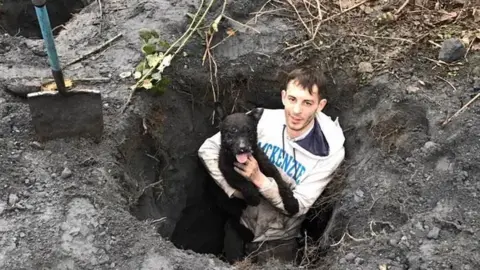
Clare says: "The final time our undercover reporters went out on a hunt we got a call to say the hunters had been filmed killing a badger.
"We all had very mixed feelings.
"Badger baiting is so violent, and both the badgers and the dogs suffer, so that was hard to deal with.
"But at that moment we also knew we had taken a big step towards proving this illegal activity was happening in Wales, and that all the work we had put in to investigate these individuals was justified."
And now the programme makers have seen the men they exposed brought to justice.
"As an investigative journalist, your job is to expose wrongdoing or illegal activity - not to take on the role of the police or prosecutors," says Clare.
"Once the programme had been broadcast our job was done - we were pleased to have exposed these men and raised awareness of this illegal activity in Wales."
